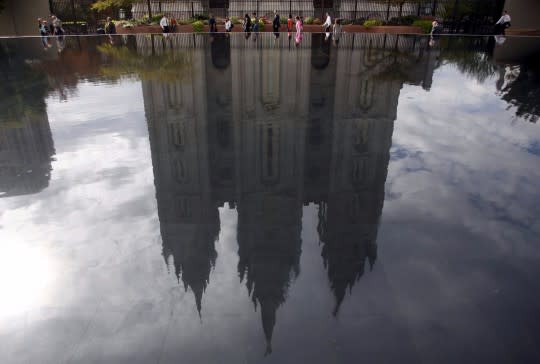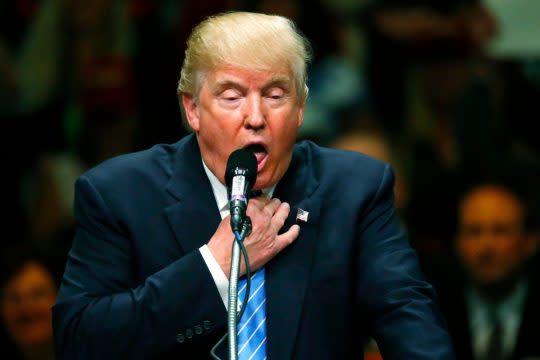Trump's Mormon problem: 'That's not how we roll in Utah'

One of the last things former Sen. Bob Bennett, R-Utah, did before he died in early May was to apologize. From his bed at George Washington University Hospital, Bennett, who had been battling pancreatic cancer for over a year, told his son he wanted to apologize to any Muslims in the hospital. “I’d love to go up to every single one of them to thank them for being in this country, and apologize to them on behalf of the Republican Party for Donald Trump.”
Bennett is hardly the first or most prominent Republican to criticize Trump for his rhetoric on immigrants and Muslims, but he is part of a growing chorus of Mormon voices that have publicly broken with the likely GOP nominee. As Trump has risen in the polls, his rhetoric has alarmed many Mormons, who have their own history of staring down religious bigotry and persecution. America’s best-known Mormon, Mitt Romney, has been a vocal critic of Trump’s candidacy, accusing him of creating “scapegoats in Muslims and Mexican immigrants.” Sen. Mike Lee, Bennett’s successor, was even more blunt in describing his feelings about Trump: “He scares me to death.” Trump’s support for a blanket ban on Muslim immigration even prompted the Church of Jesus Christ of Latter-day Saints to issue a rare statement, announcing that while the church is neutral in matters of politics, it “is not neutral in relation to religious freedom.”
Many Mormons see frightening parallels between Trump’s attacks on Muslims today and their own fraught history. Joseph Smith, the religious community’s founding prophet, was murdered by an anti-Mormon mob, and at one time, “you could kill Mormons just like you could kill deer,” Utah Gov. Gary Herbert said in a recent interview with NPR. During the 19th century, some attacks on Mormons were officially sanctioned by the U.S. government. President Rutherford B. Hayes sought to limit the immigration of Mormon converts coming to the U.S. from Europe. Quin Monson, a professor of political science at Brigham Young University and co-author of Seeking the Promised Land: Mormons and American Politics, says “any Mormon that is even somewhat knowledgeable about Mormon history has respect for the ideals of religious freedom and feels empathy for religious minorities that are treated similarly.”
That history is an important reason why Mormons are much more sensitive to Trump’s attacks on Muslims than another traditionally conservative religious constituency: white evangelical Protestants. A 2013 PRRI survey found that two-thirds (67 percent) of white evangelical Protestants believe that Islam is at odds with American values and way of life, a view shared by only 37 percent of Mormons. The majority (54 percent) of Mormons reject the notion that there is something fundamentally un-American about the Muslim faith.

Mormons also strongly disagree with Trump’s views on immigrants. PRRI’s 2014 American Values Atlas found that a majority (52%) of Mormons believe that immigrants strengthen the U.S. because of their hard work and talents, as opposed to being a burden on society. They also largely oppose a policy of mass deportation. More than six in ten (61%) Mormons say that immigrants living in the U.S. illegally should be allowed to become citizens provided they meet certain requirements. Monson also notes that at its most recent general conference, the church emphasized the plight of refugees and called on Mormons to assist them in their local communities.
Then there is the clash of sensibilities. Mormons eschew caffeine, alcohol and salty language. They are devoted to their church and hold the creation of strong families as a high priority. More than eight in 10 Mormons say that being a good parent is one of their most important goals in life, while nearly three-quarters say having a successful marriage is one of their chief life goals. Trump seems to revel in using offensive language, and his personal life, including his admitted infidelities and multiple divorces, present a distinct contrast.
Given this, it’s not that surprising that Trump stumbled mightily in the heavily-Mormon Utah primary. However, the scale of Trump’s loss was notable particularly in comparison to his performance in other caucus states. Only 14 percent of Utah caucus-goers voted for Trump, dramatically less than his support in any other caucus state. At the county level, things haven’t looked any better for him. Nationally, four out of the five counties where Trump has been weakest, tallying vote totals of between 7.6 percent and 11.3 percent, have large Mormon populations.
Having dispatched his primary opponents, the real question for Trump now is whether Mormons will come home or stay home in November. Over the last half century, Mormons have been the most reliably Republican demographic in the country. They are unlikely to shift their support to Hillary Clinton, and indeed there are signs that some Republicans are rallying to his candidacy. Trump’s popularity among self-identified Republicans nationally has hit its highest point since last August. Even Republicans who at one point were highly critical of Trump have rallied around the presumptive nominee with remarkable efficiency. Sen. Orrin Hatch, who once said of Trump “some of the things he’s said, they curdle my blood,” has since endorsed him.
It’s unclear whether Mormon voters will follow. A recent survey of Utah voters found that only 43 percent were committed to supporting Trump in the general election against Hillary Clinton. Utah Lt. Gov. Spencer Cox has been particularly vocal about his distaste for Trump, retweeting anti-Trump sentiments on Twitter, and delivering a blistering attack after Trump questioned Mitt Romney’s faith. “A person running for office, in our party, thinks it’s OK that if you question his politics, he can question your religion,” said Cox. “I have a message for the 3 million people in Utah for Mr. Donald Trump: That’s not how we roll in Utah, and that’s not how we roll in the United States of America.”
Then there is Romney himself. The former Republican nominee remains an exceedingly popular figure among Mormons — 86 percent of Mormon voters have a favorable view of him. Romney has already stated that he plans on skipping the GOP convention this year, and Trump doesn’t seem at all interested in ending the standoff. In a recent campaign event held in Anaheim, Calif., Trump laid into Romney calling him “stupid,” “a choker,” and joked that he “walked like a penguin.”
But Mormons are still heavily Republican and Trump is going to be the Republican nominee. So what impact might this all have? Hillary Clinton is still unlikely to win Utah or Idaho. However, if enough Mormons decide to sit out this election or defect to Clinton, it could give her an advantage in other Western states, such as Nevada or even Arizona, which have significant Mormon populations. A surge in Hispanic voting in those states combined with anemic turnout among Mormons or even modest defection could present a considerable problem for Trump in these states. Even being forced to compete in those states could be a damaging drain on the Trump campaign’s resources. The Mormon problem is not an insurmountable issue for Trump at this point in his campaign, but small problems have a way of piling up.

